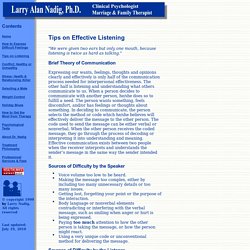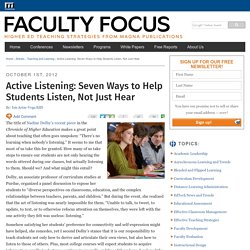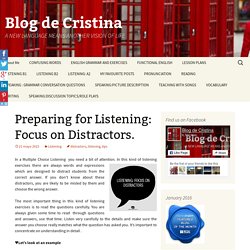

How to improve your English listening comprehension. Why spoken English is difficult to understand A lot of English learners have trouble understanding what native English speakers say.

One reason that real English is difficult to understand is that the English in classrooms and textbooks is very different from how people really speak. Some of the differences include: People use different words and phrases in spoken English than they do in writing. They use slang. Topic-based lessons. By Miles Craven A series of topic-based listening lesson ideas from Miles Craven with an emphasis on authentic, real-world listening, using both native and non-native speaker accents.

Overview The listening activities provided here offer a wide range of listening practice. The activities cover a variety of formal and informal styles of language, from interviews and presentations to conversational dialogues. Passages are various lengths, and for each passage a photocopiable recording script is available. The emphasis is upon authentic, real-world listening, using both native and non-native speaker accents. Format Each activity is consists of step-by-step teacher’s notes to guide you through the main task, and post-listening follow up suggestions.
TimingActivities last between 15 and 45 minutes. Listening skills: guide. By Miles Craven A short, handy guide to the skills students need to practice to become better listeners.

Listening in a foreign language is a complex process. Students have to be able to understand the main idea of what is said, as well as specific details. They may need to check any predictions they have made, and understand the speaker’s meaning, emotions and opinions. They may have to infer relationships between speakers, or identify the context in which the speakers are operating. Listening skills: Top tips.
Listening skills: FAQs. How to teach listening. Effective Listening. "We were given two ears but only one mouth, because listening is twice as hard as talking.

" Brief Theory of Communication Expressing our wants, feelings, thoughts and opinions clearly and effectively is only half of the communication process needed for interpersonal effectiveness. The other half is listening and understanding what others communicate to us. When a person decides to communicate with another person, he/she does so to fulfill a need. The person wants something, feels discomfort, and/or has feelings or thoughts about something.
Sources of Difficulty by the Speaker Sources of Difficulty by the Listener The Three Basic Listening Modes Competitive or Combative Listening happens when we are more interested in promoting our own point of view than in understanding or exploring someone else’s view. Levels of Communication Clichés. Active Listening: Seven Ways to Help Students Listen, Not Just Hear. The title of Nadine Dolby’s recent piece in the Chronicle of Higher Education makes a great point about teaching that often goes unspoken: “There’s no learning when nobody’s listening.”

It seems to me that most of us take this for granted. How many of us take steps to ensure our students are not only hearing the words uttered during our classes, but actually listening to them. Should we? And what might this entail? Dolby, an associate professor of curriculum studies at Purdue, organized a panel discussion to expose her students to “diverse perspectives on classrooms, education, and the complex relationships between teachers, parents, and children.”
Preparing for Listening: Focus on Distractors. In a Multiple Choice Listening you need a bit of attention.

In this kind of listening exercises there are always words and expressions which are designed to distract students from the correct answer. If you don’t know about these distractors, you are likely to be misled by them and choose the wrong answer. The most important thing in this kind of listening exercises is to read the questions carefully. You are always given some time to read through questions and answers, use that time. ♥Let’s look at an example How long has Liz been snowboarding? A. The underlined words in the transcript all appear in the possible answers a, b or c, but only one answer is correct.
♥Read the transcript, choose the right answer and say why the other are not correct I first did it when I was on holiday with my parents- When I was younger I used to go skiing every year with them and then one year I tried snowboarding and I haven’t skied since then. Hints on Blank Filling Listening Comprehensions+ 2 Listening Activities. Five Different Ways to Practise your Listening Skills. I won’t spend much time introducing this post, mainly because today is one of these days when the muse has decided to leave me.

Perhaps you’re wondering what else you can do to pass your listening test with flying colours apart from doing every single listening comprehension exercise in your student’s book and all the ones in the workbook. I’m not trying to reinvent the wheel, but here are a few things you might want to try. 1.Read a few tips and put them into practice. Students often complain that despite grasping the main information content of the recorded material, they sometimes seem to be unable to provide the right answer and this leads to frustration.
Getting a high mark in a listening comprehension exercise requires practice, lots, and also knowing a few tips. 2.The obvious. Los mejores podcast para aprender inglés. The Mimic Method Blog - The Mimic Method. Cursos y canciones: la forma más divertida de aprender inglés - Subingles.com. ¿Sabes que la práctica es la forma más rápida de aprender un idioma?

Así te lo asegurará cualquier experto. Todos conocemos casos de personas que se fueron a vivir a un país extranjero sin conocer el idioma y empezaron a dominarlo en mucho menos tiempo que el que le lleva a un estudiante... ¿Por qué? Porque la necesidad de comunicarse hace que practiques, y al practicar todos los días forzosamente aprendes. Pero no hace falta irse al extranjero para dominar el inglés: lo importante es practicar y tener la suficiente fuerza de voluntad para hacerlo cada día, o al menos muy a menudo.
Aunque, por supuesto, necesitaremos combinar esta práctica con horas de estudio que abarquen la gramática, el vocabulario, la expresión y la comprensión escrita, esta es la forma en que realmente llegaremos a dominar realmente el inglés. Cantar canciones en inglés es una práctica que ofrece numerosos beneficios: Escuchar - Inglés para Latinos. 41 unique ways to practice listening to English. How to improve your English listening comprehension.